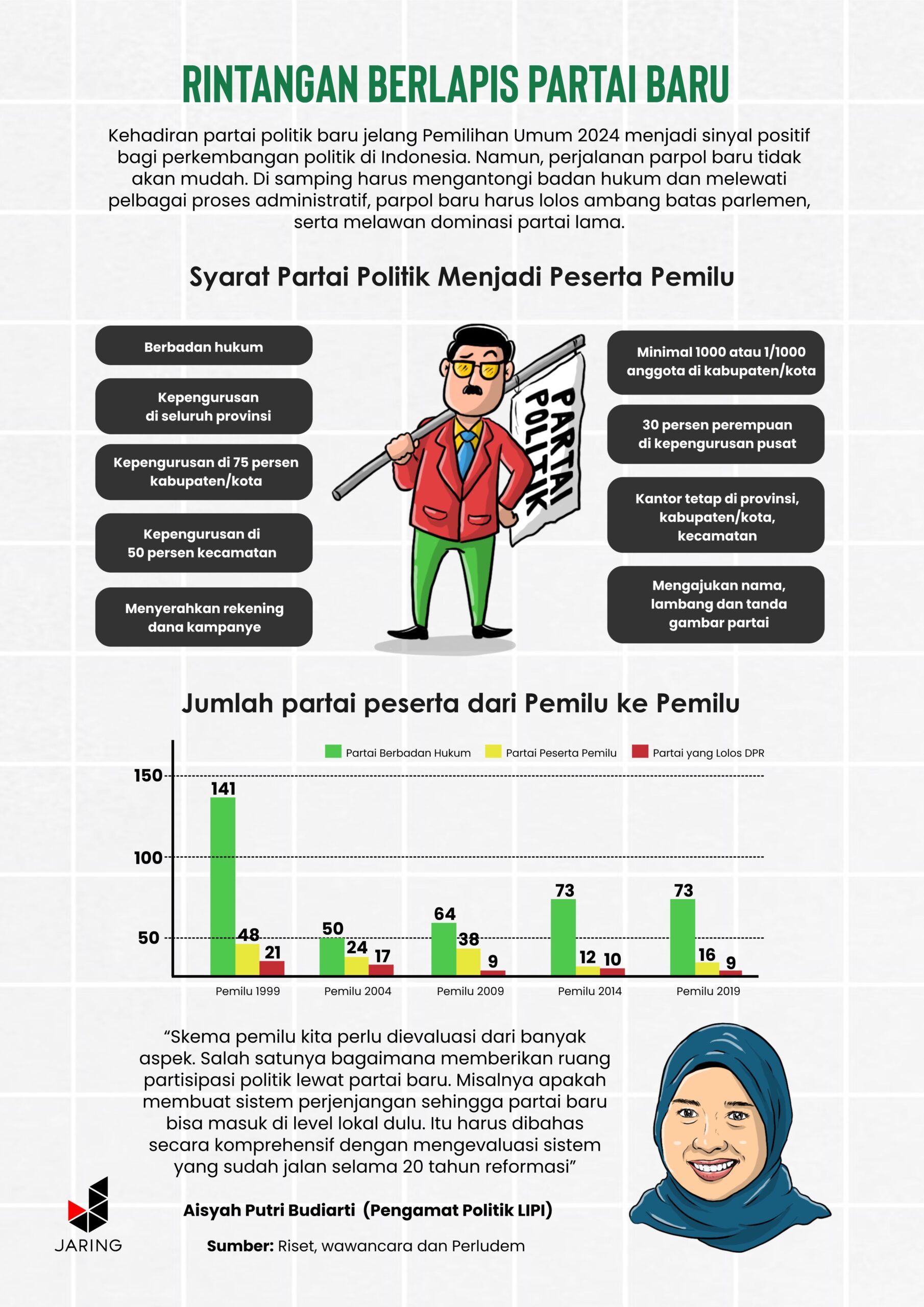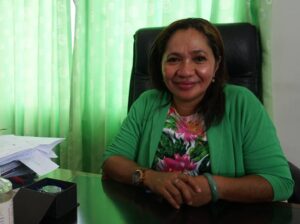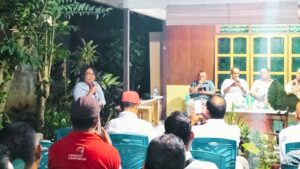The banner of Partai Rakyat Adil Makmur (Prima)—new political party in Indonesia—stretches out in the yard of a yellow-painted house on Jalan Saudara, Beringin Village, Medan Selayang Subdistrict, North Sumatra. The house belongs to the Chairman of the City Leadership Council (Dewan Pimpinan Kabupaten) of Medan City, Doli Nadeak. Ahead of the factual verification of the 2024 Legislative Elections, some of the rooms in this residence are arranged to resemble a party office, complete with work desks and chairs. On one of the walls, there is also a state symbol and a photo of President Joko Widodo and his Vice. Meanwhile, the other room is still used by the owner as a place to live.
“A lot of people are like that. The administrator’s house is used as an office,” said Prima Party Spokesperson, Farhan A. Dalimunthe when interviewed on Friday, November 19, 2021.
The Prima Party just has carried out the conversion of the function of the house into an office to fulfill the requirements to become a participant in the 2024 General Election. According to Farhan, the scheme for using the house for the management is cheaper than renting an office building. The party only needs to take care of the borrow-to-use certificate, along with the domicile that is known to the local sub-district. “We are trying to build this party from 0 Rupiah,” he said.
In addition to having to be a legal entity, Article 173 of Law Number 7 of 2017 concerning General Elections requires that political parties have party management offices, both in the province and district/city level. The management throughout in this province at least consists of 75 percent of the regencies/cities, and 50 percent of the sub-districts. The management must also meet the quota of 30 percent women and have a minimum of 1000 members or 1/1000 in the district/city.

Regarding this matter, the Prima Party stated that it had built management in 34 provinces, 389 regencies/cities and 3800 sub-districts throughout Indonesia since the declaration six months ago. While the number of registered members is 6 thousand people.
The majority of party members, said Farhan, came from the workers, farmers, indigenous peoples, students, merchants, and civil society organizations. These include the Nusantara Alliance of the Indigenous Peoples (AMAN), the National Front for the Indonesian Workers’ Struggle, the National Student League for Democracy, the Islamic Student Association, the National Farmers’ Union, the Supreme Council of Indonesian Faith, and progressive Islamic groups. “Whatever the story, Prima is ready to face the general election. For some of the activists who joined Prima, this is the last battle because they have been fighting for a long time since the reformation,” he said while admitting that the road to Senayan was not easy.
In the 2019 general election, the Election Commission only passed 16 of the 27 parties that registered as the participants of the election. Of that number, only four new parties have successfully passed the verification, namely the Indonesian Solidarity Party (PSI), Perindo Party, Berkarya Party, and the Garuda Party. In addition to administrative and factual verification, new parties will be faced with a parliamentary threshold of 4 percent of the national valid vote. According to him, a new party must at least get a minimum of 6,170,304 votes. If not, then the Prima Party will suffer the same fate as the seven parties that failed to make it to Senayan in the 2019 election. At that time, there were around 13 million votes wasted from the total votes for parties that did not pass the parliamentary threshold.
Even so, the desire of political parties to pass through to Senayan in the 2024 election did not subside. Until the end of November 2021, there have been at least 11 new parties that have declared themselves to be participating in the upcoming 2024 elections. Among them are the People’s Wave Party (Gelora), the Ummat Party, the Bright Indonesia Party (PIT), the Indonesian Sovereign State Party (Clever), the Peaceful Indonesia Party (PID), the Masyumi Party, the Small and Medium Enterprises Party (UKM), the Labor Party.
The Labor Party, which is fronted by the President of the Confederation of Indonesian Workers Unions, Said Iqbal, have even targeted the acquisition of 15-20 seats in the House of Representatives in the upcoming 2024 election. The party is supported by 11 organizations, namely the Confederation of All Indonesian Workers Unions (KSBSI), the Federation of Indonesian Metal Workers Union (FSPMI), the Indonesian People’s Organization (ORI), the Confederation of Indonesia Trade Union (KSPI), the Indonesian Peasants’ Union (SPI), the Confederation of Indonesian Workers’ Union (KPBI), Federation of Mining Chemical Energy Workers Union (FSPKEP), Federation of Health Pharmacy Workers Union (FSB Farkes), Indonesian Honorary and Private Educator Forum (FPTHSI), and Indonesian Women’s Movement (GPI).
Since it was declared in early October 2021, the Labor Party claims to have around 600,000 members across the region. The Labor Party is targeting the data collection process through the Political Party Information System (Sipol) of the General Election Commission (KPU) to be completed in December this year. However, according to the Chairman of the National Assembly of the Labor Party, Agus Ruli Ardiansyah, the online-based registration process is not an easy job. “The ones who are still having trouble are fellow farmers in the village who need to register online because they don’t have cellphones and there is no signal,” he said.
In the 2024 General Election, the Labor Party brought up dozens of labor issues after the issuance of the Job Creation Law, including the abolition of the outsourcing system, living wages, exploitative working hours, maternity leave for women workers, the welfare of farmers, fishermen, and teachers. “The Labor Party is fighting for the worker’s group who are hit hard because they always lose politically. This is one of our steps to enter the policy-making space in the parliament,” he told Jaring.id, Wednesday, November 10, 2021.
Meanwhile, an Ex politician from the Islamist Prosperous of Justice Party (PKS) who is currently the Secretary-General of the People’s Wave Party (Gelora), Mahfudz Siddiq admitted that it was difficult to fulfill all the requirements for election participation in the Covid-19 pandemic situation. “The pandemic situation has limited the space for movement. We are optimizing the approach through digital communication, such as digital recruitment with an online registration mechanism,” he said when contacted on Tuesday, November 9, 2021.
it is needed a year after the establishment, said Mahfudz, the Gelora Party could have just completed the parties’ management of all provinces, 514 districts/cities, and 88 percent of sub-districts throughout Indonesia. The board of the Gelora at the provincial level is filled by former colleagues in the PKS Party. He noted that if there are 550 thousand members of the target of 1 million members that have been collected. In order to pass the Election Commission requirements and the parliamentary threshold, the Gelora Party is targeting 2000 members in each sub-district.
However, the politician, who has previously held the position of a member of the legislative in parliament, is concerned about the online-based verification system for political parties by the Election Commission. The reason is that the management of information and data systems during the 2014 and 2019 elections often had problems. One of them is related to the process of identifying the citizen id card numbers in Papua and West Papua. According to him, the sub-district data contained in the Sipol application is incomplete because it does not follow the data on the division of the sub-district. “There is still time for the Election Commission to consolidate data and information systems so that our elections are made easier by digital means so that it will not be a problem,” he said.
Commissioner of the Indonesian Election I Dewa Kade Wiarsa Raka Sandi did not deny the problems caused by the online verification process. The Election Commission is still developing the Sipol application function. With a number of improvement steps, he is sure that the verification process for the management and members of political parties will be much better. “The problems faced by parties in the previous election are input for future improvements to Sipol,” said Dewa when contacted on Tuesday, August 16, 2021.
A month before 2021 ends, the Election Commission is aligning regulations regarding to the registration, verification, and determination of political parties in accordance with the decision of the Constitutional Court (MK) No. 55/PUU-XVIII/2020. The Court decided that political parties that had passed the verification of the 2019 General Election and met the Parliamentary Threshold requirements only needed to be verified administratively. Meanwhile, parties that do not pass the threshold and new parties will go through administrative and factual verification.
This decision is not without a lawsuit. In September 2021, four parties that did not pass the parliamentary threshold in the 2019 elections just refiled a lawsuit against the verification of political parties. The Crescent Star Party, the Berkarya Party, the Indonesian Solidarity Party, and the Perindo Party requested that the parties participating in the 2019 General Election that passed and did not pass the threshold were sufficiently verified by the administratively only. Administrative and factual verification is applied to new parties that have never been participated in the election previously.
The Executive Director of the elections watchdog Association for Elections and Democracy (Perludem) Khoirunnisa Agustyati has a different view. She considered that the Constitutional Court’s decision tended to favor parties that had already won seats in the Indonesian Parliament. “The Constitutional Court’s decision is like giving tickets to the parties in the Parliament. Even though the conditions of the parties may be different from five years ago when they passed the verification,” said Khoirunnisa on Tuesday, November 9, 2021. Therefore, she encouraged the Election Commissions to conduct administrative and factual verification of all parties. “Administrative verification must be factually checked so that it doesn’t just meet the administrative requirements only,” she continued.
In line with Khoirunnisa, a political observer from the Indonesian Institute of Sciences (LIPI), Aisyah Putri Budiarti believes that the current political system and elections are favorable to the parliamentary party. In order to ensure the participation of new parties in the general election, according to her, the conditions for establishing a party need to be simplified. In addition, it is time for Indonesia to implement a tiered competition system in which new parties first compete at the local level before contested at the national level. This competition system will allow the new party to have a management network in all regions. “Our electoral scheme needs to be evaluated from many aspects. Not only the opportunity for new political parties to participate, the issue of Indonesian election regulations is also layered,” she said in an interview on Thursday, November 11, 2021.
However, Aisyah considers that the 2024 election contestation will still be open to new parties. Moreover, various survey results have shown that there is public disillusionment with the parties in parliament. The results of a survey by the Indonesian Survey Institute (LSI) in February 2021 revealed the low party identification (party-ID) of the Indonesian people, which was only 11.6 percent. While the Indonesian Political Indicators survey is no more than 9.8 percent. The results of this survey show that most Indonesians are not fanatical about a particular party. “I remain optimistic because the presence of a new party is important to provide us with new space and choices in politics. It is impossible for us to just sit idly by with the existing political parties,” she said. (Debora B. Sinambela)







